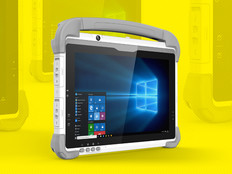HIMSS 2019: Virtual Reality May Enhance the Lives of Seniors
Technology companies are continually developing new sensor-enhanced smart devices that, in theory, should help improve the lives of seniors. However, if there’s not a desire to use such tools, they won’t work, said Dr. David Rhew, chief medical officer and vice president and general manager of healthcare for Samsung.
Rhew, who spoke Monday at the HIMSS 2019 conference in Orlando, Fla., stressed that solutions that can enhance the ability to live independently and maintain interpersonal relationships are likely to be stickier and produce better results, since those aspects of life are some of the most appealing to seniors.
JOIN THE CONVERSATION: Follow @CDW_Healthcare on Twitter for continued HIMSS19 coverage.
“They want to reduce their cognitive decline, they don’t want to lose their mind or memory, the don’t want to be lonely — they want to become more functional,” Rhew said. “If you can address those needs, then you’re more likely to get to a point of constant action and participation.”
One tool that has several use cases discussed by Rhew was virtual reality.
Virtual Reality Proves Alternative to Opioids for Pain Management
In some instances, VR can help individuals to better tolerate chronic pain.
“Traditionally, the role that we have found in healthcare that we can provide for pain is around providing pain medication, which unfortunately led to the consequence of the opioid epidemic, where severe pain is managed with an opiate,” he said. “The more you continue to rely on that, the more you realize you end up in this vicious cycle that’s hard to get out of.”
VR’s effectiveness is that it helps to introduce concepts of mindfulness to individuals, distracting seniors — and other patients using the technology — and allowing them to divert their focus from constant or potential pain.
“We’re starting to see that this is becoming a real therapeutic alternative to narcotics,” Rhew said.
MORE FROM HEALTHTECH: Learn how medical professionals are leveraging VR for training.
VR Improves Vision and Fights Anxiety for Patients
Additionally, VR is being used to treat conditions such as macular degeneration, which results in impaired vision in the center of an individual’s visual field. Customized VR functionality leverages eye-tracking software that finds and latches on to a user’s preferred retinal locus and optimizes images for the wearer.
In one test of the technology, conducted by researchers at Johns Hopkins Medicine, patients entered with a baseline vision of 2400, which is essentially legally blind, Rhew said, and improved it to 20/30.
“We are at a point where the technology works, but people just don’t know about it yet,” Rhew said. “We need to figure out a way to help people understand the opportunity.”
VR can also reduce stress and anxiety in individuals, and can prompt memories that can help to re-engage seniors in daily life, Rhew said.
“It helps people reconnect,” he said. “It helps unlock the opportunity for them to then start talking.”
Keep this page bookmarked for articles from the event. Follow us on Twitter @CDW_Healthcare, as well as the official organization account, @HIMSS, and join the conversation using hashtags including #CDWHIMSS and #HIMSS19.










